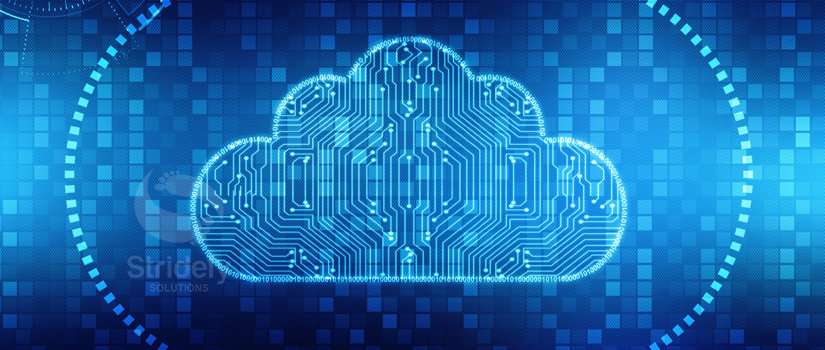Innovation is one of the major elements of growth. An organization’s growth is dependent on how fast it can innovate and adopt new technology. Traditional enterprise resource planning systems were too rigid and failed to keep up with advanced business practices and technology. For this reason, Cloud ERP deployment has become one of the most preferred options for organizations of all sizes. Gartner has called it the ‘Everywhere Enterprise’ concept.
The value of ERP systems doesn’t reside in a single system but it expands continually. Cloud-based platform link accounting and finance automation with human resources, supply chain, tax technology, marketing, and sales, including several other applications.
Success Case: Automating Business-Critical Processes Via Next-Gen RPA Solutions
Organizations with an efficient cloud ecosystem ensure quick and effective strategic adjustments, marketplace response, and disruption in supply chain management. They help in managing challenges of tax compliance in a better way in comparison to the counterparts that are less digitally advanced.
Factors that signal evaluation and replacement of legacy ERP systems
Obstacles in growth – ERP software features certain limitations which affect market expansion. Besides, they also block the organization’s way of achieving its objectives. It is true, especially in cases where expansion to new countries or regions involves complexities, tax compliance, accounting, and financial reporting.
Issues in data-sharing – Friction in system integration and data-sharing issues that help in impeding collaborations in different verticals of business are one of the major signs for updates in the ERP system. Legacy ERP and new applications integration can be time-consuming and cumbersome for maintaining, establishing, and updating. Extra maintenance and integration work may require an internal tax on business agility and innovation.
Deficiency in customer experience – Limitations within legacy ERP environments is also a major reason that hinders the ability of an organization to meet the changing expectations of customers, especially when it comes to customizations, mobile communications, and self-service portals that have tax compliance, pricing, and accounting implications.
Advantages of Cloud ERP Systems for Businesses
Upfront operating and infrastructure costs –
It is one of the major advantages of cloud ERP solutions. The overall cost is reduced starting from implementation to the end process. On-premises ERP allows businesses to incur all kinds of upfront costs involving database creation, purchasing servers, consultants, initial implementation, security, backup, and IT staffing.
Organizations with ERP systems implemented on-premise need to bear additional costs to maintain on-call or in-house resources, updates, upgrades, and additional servers which increase with the growth of the company. The cloud ERP service provider manages and hosts the software on their own servers for avoiding upfront costs and other costs that are incurred for maintenance, IT staff, updates, and security. Continuous IT support is provided by the vendor which makes things easier for the businesses.
Also Read: Cloud & Innovation in the High-tech Industry: The Co-relation that you must think of
Speed implementation –
Implementation time is a major hurdle faced by businesses that implement new ERP solutions. It affects the business downtime directly. Generally, a business may grow more quickly with the integration of a cloud ERP system into its existing business system. It doesn’t require any hardware setup or training or hiring IT staff.
Easy accessibility to business info –
Businesses with cloud ERP systems can easily access all kinds of data and information instantly, from any device and anywhere. It helps in ensuring that the organization’s employees have access to the same data, irrespective of the business location or unit. It helps in ensuring easy and quick decision-making.
High-end scalability –
With Cloud ERP solutions business scaling becomes easier as it eliminates the challenges of more number of servers as the users increase. The growth of cloud ERP systems is aligned with business growth.
Companies may start with core and basic functionality and they move to advance methods as their business grows. The best part is that they don’t need to add hardware to enhance their systems.
With a cloud ERP solution, individuals can globally access information of businesses by connecting it to the web. Local servers aren’t important as the business grows by acquisition or merger. Users can bring new units online in real time. Generally, cloud vendors have data centers across the globe and they save customer data and other crucial info in different locations. It provides more reliable and better service.
Easy customization –
Cloud ERP scales with a business and it can be tailored to fit the business requirements – right from the beginning as it evolves and grows. On-premise ERP software is customizable and it can be connected to the current system and software. It’s one of the major reasons that some organizations avoid upgrading their ERP on-premise systems and prefer running it on outdated technology.
Cloud ERP systems also integrate seamlessly with other products (cloud-based). Moreover, users can add new modules to the ERP system without additional hardware or downtime. It allows businesses to remain proactive and adjust quickly to changes and transformations that take place in the industry and in consumer trends. Plus, it also prepares the organizations for unforeseen circumstances.
No business disruptions and easy updates/upgrades –
Generally, Cloud ERP vendors manage system updates and upgrades on a continuous basis. They align the services with advancing business needs to ensure customers use updated technology. Upgrading or updating ERP software needs more time. In some cases, vendors may need to hire contractors for managing the entire process. Updates with on-premise cloud ERP take only a few minutes and it generally occurs during “after-office hours” for preventing business disruptions.
Better compliance and security of business data –
Rely on external vendors for housing the business data of a company safely. It is one of the major concerns for several organizations. Cloud ERP vendors facilitate users with better compliance and security. They provide affordable solutions to companies. Businesses may remain confident with proper data backup. The vendors are well-versed with the proper tools and planning required for disaster recovery.
Companies need to have business continuity and disaster recovery plan for their ERP on-premise solutions as they include catastrophic data loss risk in the case of a natural disaster, fire, break-in, or software or hardware failure.
Cloud ERP vendors offer end-to-end data encryption and top-notch security of data. However, it is to be noted that organizations are responsible for access management and identity of ERP users. Plus, it also secures their smartphones and other devices with internet accessibility.
Automation in the business process –
In case of on-premise hardware failure the organization could spend a huge amount of their money and time transferring data and information to the storage system. Cloud ERP-based system works in coordination with the data centers and disperses the data redundantly. It is also advantageous in terms of giving access to crucial data and info over the internet.
Endnote
Businesses with huge administrative and IT teams may have to deal with pushback from the company’s stakeholders. Administrators may move control over the automated process if they chose to move the ERP software from on-site to offsite. Also, with vendors like Stridely Solutions managing the entire infrastructure and maintenance the teams may also lose control over the operational process.
Organizations with strict policies for cyber security may face restrictions when hosting client info in the cloud. They may fail to experience the advantages of cloud ERP solutions or the ‘Everywhere Enterprise’ idea due to regulatory compliance problems. Hence, companies should make sure they tie up with vendors who accommodate their services with localized features and content so that users can easily comply with local regulations while managing other elements of global trade.


